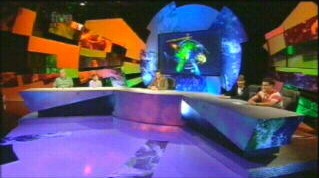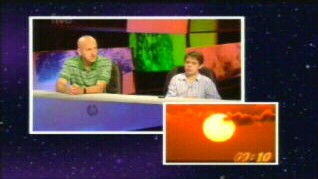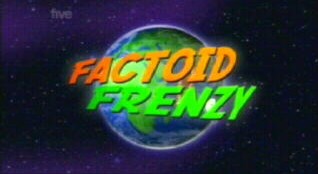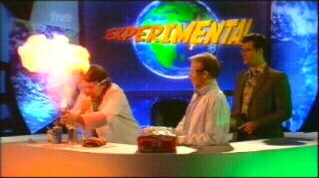Weaver's Week 2008-09-28
Last week | Weaver's Week Index | Next week
Contents |
The What in the World? Quiz
Shine for Channel 5, Friday 7.30
This column seems to have a love-hate relationship with Channel 5's quiz shows. Actually, that's not right: we have a love-indifference relationship. Those we don't particularly like, they cancel after one season, which pleases us. Those we really love, like The Mole, 19 Keys, and even Double Cross, they cancel after too short a run, which seriously annoys us. And so it is with this particular little gem, which was commissioned for a run of precisely 3 (three) episodes.
Marcus Brigstocke is our host, which is always A Very Good Thing. He's funny, warm, prone to go off on the most wonderfully entertaining rants, human, and never loses sight of ways to make the world a slightly better place. We like him a lot. Brigstocke knows a lot about making the mundane entertaining. He also knows a lot about science, nature, technology, human achievement, and snowboarding. Almost all of these skills are used on this quiz.
The comedian Lee Hurst and the workmanlike Dominic Holland are the resident captains. For each show, they're joined by a guest scientist, naturist, or child genius. Er... hang on. They're joined by a guest scientist, naturalist, or child genius. Pre-watershed entertainment, mercifully. The guest has brought something with them to show the audience. It's a talking point for the awkward opening moments of the show, and helps the viewer to get to know the guest a little more quickly than just blabbing with the host.
Round one, World of Extremes, is a gentle introduction. Each team is given a multiple-choice question relating to various record-holders, with three possible answers. For instance, which is largest: the leap of a kangaroo, the largest sunflower ever recorded, or the longest long jump by a human? Two points for a correct answer, one point if it's handed across to the opposition.
Round two, Time Bomb, has a rather clever conceit. Three clips have been prepared – all last somewhere between 40 and 70 seconds. One team will select a clip. While it's playing in one corner of the screen, the other team will be asked questions until the clip has finished. The round is actually more exciting than it sounds – there's a visual of something completely unrelated to the sound, Marcus is asking questions at a velocity that's surely illegal in built-up areas, and the other team are imploring their man to get on with it and complete his 50m swim under ice. It's frantic, confusing, and an awful lot of fun.
After a brief commercial break (one that doesn't actually contain any commercials...) we resume with round three. Experimental is a live experiment round, in which the teams are challenged to predict what will happen under certain conditions. What happens if you put a Pyrex dish into a bowl of cooking oil? Or blow custard powder into a naked flame. (We'll tell you: the powder explodes into a spectacular ball of flame that can take your eyebrows right off. Don't try this at home, kids.) Five points for a correct prediction and explanation, fewer points for partial answers.
It seems to be common that the final round in a good quiz is the weakest. It's the way in this quiz, too. Factoid Frenzy is a collection of short clips of film and still pictures, all overlaid with facts moving across the screen. Though it's fast-moving, it's a random collection of facts and figures without any context. Marcus asks contestants to complete the statements they've just seen. It's a test of short-term memory, and doesn't really encourage understanding in the way the previous round did.
For a show that doesn't seem to have had any significant budget, we're rather impressed with the graphics. They're jazzy and brassy, giving a sense that the show might be about serious matters, but it's going to be fun. With the exception of the final round, it's fun throughout.
We're less impressed by Channel 5's weak commitment to the show. 7.30 on a Friday night is a good place to bury contractual obligations. The show is smart enough to count as part of C5's public service quota, which probably explains why the channel has stuck it in the least-viewed part of the schedule, and only commissioned the bare minimum of three episodes. That's one-and-a-half hours of science and education programming ticked off the quota, without really trying to build an audience.
Nor are we impressed with the way Channel 5 looks like a tacky cable channel, complete with on-screen logo saying that we're watching the station we're watching. Of course we're watching the station we're watching, we don't need to be reminded of it all the time. We especially don't need to be reminded of the fact when it's obscuring the on-screen scoreboard during the final round. Stop looking cheap and nasty, and show some respect to your audience and your programme-makers.
We would have liked to see much more of this show, but Channel 5's corporate cowardice has made that impossible. We would hope that they were commissioning shows because they are well-made, entertaining, and informative. But no, they're just commissioning to tick boxes in the OFCOM report. Clearly, Channel 5 isn't interested in quality programmes, if it ever was.
University Challenge
We begin with a late result: Oxford United 3, Cambridge United 1.
Match 12: King's Cambridge v Edinburgh
The opening question is Speech of the Week, a long quotation from the "Pound in your Pocket" speech of 1967. It goes to King's College Cambridge, making their first appearance on the show in the BBC revival. The college gets on the radio every year, courtesy of the Christmas carol service. Alumni include the economist Keynes and the author EM Forster. We'll say that they actively knew about the Hubble constant, rather than guessed at it, but then even the guesses count.
A paper by office boys, for office boys? The Daily Mail? Shome mishtake, shurely. Anyway, Edinburgh get on the board with their first starter, and get questions about small particles. The university was founded by James VI in 1582, and alumni include Walter Scott, Charles Darwin, Arthur Conan Doyle, and Dr. Gordon Brown. We have to say that Edinburgh guessed at the name of the Mezozoic era in the first visual round – a diagram of eras and periods in ancient history – but King's lead is 50-30. Edinburgh pull within five after the next starter, and then we'll take Guess of the Week:
- Q: Lillian Schwartz said in 2004 that she had found the first evidence of eyebrows, where?
- King's Cambridge, Petunia Gold: On the Mona Lisa?
It was either that, or the face of the bloke from Busted. The audio round comes rather early, it's on music from Russian ballets, and King's leads 85-45.
One starter asks which county links various people, ending with Bernard Matthews. Bit of a dead giveaway, there. The question about Adam Smith's preferences for taxation fall on deaf ears, but Ben Gazur is able to identify the liver from the fact that it can regenerate from just a quarter of itself. The sides are asked for a neighbour of Algeria, but neither Libya nor Morocco is the answer. How many other neighbours are there, apart from Tunisia? Why do the people of High Wycombe weigh their mayor when he takes office and leaves it? The second visual round is on paintings by French artists circa 1900, and King's Cambridge has a slight lead, 100-95.
Edinburgh take over with the first starter of the final stanza, only for King's to take back the lead in the following set of bonuses. The International Phonetic Alphabet is an absolute pain, and we've long suspected that it's a joke invented by cunning linguists to confuse the rest of the world. King's pulls away with a perfect set of bonuses on the English Civil War, and each member of the side has answered at least one starter correctly. The sides draw level when Adam Burns works out that 100 links make one chain, and they take the lead with the Judith Keppel Memorial Question, that Eleanor of Aquitaine was married to Henry II.
Edinburgh pull away further with a set of bonuses on trace elements of the human body, but King's respond with knowledge of adjectives deriving from planets. King's get a set of bonuses on the length of musical notes, Edinburgh get a starter about the end of the American Revolution, but none of the starters. The entire contest is tied at 180-all, and will surely be decided by the next starter.
King's Cambridge will be back in the repechage:
- St John's Cambridge 185
- King's Cambridge 180
- Surrey 170
- Pembroke Oxford 150
For the first time in the BBC revival, the side that lost in the first match of the season (Hull) will not return in the repechage.
A list of minerals. Talc and Diamond. Ah, the Mohs scale! Mike Blumenthal gets it for Edinburgh, the side drops the bonuses, but time expires, and Edinburgh has sneaked a win, 190-180. Good grief, that was a fine match! Matthew Wallen got five starters for King's Cambridge, their bonus conversion rate was 17/30. Edinburgh made 15/35, Adam Burns got five starters. Both sides made one missignal.
Next match: Bristol v Manchester
Mastermind
Episode 4
A couple of weeks ago, we noted that women had won the first two episodes of the still-young series. The men will even the score at 2-2 this week, as it's an all-bloke show. Smell the testosterone!
Striding up to the chair is Roger Canwell, who will tell us about The Late Stuart Age, 1660-1714. It's the era of the Bloody Assizes, the Restoration, the Glorious Revolution, and a general election every three years. Mercifully, popular democracy had yet to be invented, so the nation was spared a permanent campaign between Bill Deedes and the rock group Status Quo. It's a good round, ending on 14 (1).
Good, but there's room for someone to tilt at. Jack Pearce is next up, he's discussing Steely Dan, a popular music group established in 1967. They're known for such hits as, er, "Haitian Divorce" (which doesn't appear in the questions), sparking Donald Fagen and Michael McDonald's careers, and inspiring the name of Deacon Blue. 10 (2) is the contender's score.
John Webley comes up to the chair with The Spenser Novels of Robert Parker. These are detective novels, written since the late 1980s, allowing for questions ranging from Maslow's hierarchy of needs to Robin Hood's Purple Sandpiper. He scores 12 (3).
Last to take the short walk is Pete Wolstencroft, who has been swotting up on the Life and Career of Joe Frazier. That would be the boxer active from the early 1960s until 1975, best known for his battles with Muhammad Ali. He ends with 11 (2).
Mr. Pearce tells us that the group have been recording their rock-jazz-fusion for many decades, and says they're "unclassifiable". They've been covered by such heavy monsters of rock as Barbra Streisand, and the contender is able to recognise "The Lady is a Tramp" from a quick snatch of the lyric. He's unfortunate to guess "Tracey Emin" when the modern artist in question is Damien Hurst, but gets "Springtime for Hitler" from its plot. He ends up with 21 (5).
Mr. Wolstencroft has done a little amateur boxing in his time, and is now a teaching assistant. We'll let readers imagine a six-foot gentleman trying to fit behind those small desks at primary school. He gets off to a great start, and tries to answer as quickly as he can, a tactic that paid a small dividend last week. His correct answers include "rubber" and "karma", but the gods aren't with him, ending on 20 (6).
Mr. Webley (Dr. Webley? We never know how to address dentists. Other than "sir") has spent a decade pulling teeth in Germany. Where, apparently, they're more nervous than in Britain. Particularly when the builders are extending the surgery. The name is familiar, we believe he won The Krypton Factor in 1982 and is back for another of television's toughest quizzes. We did not know that "tantalum alloy" contracted to "tannoy", but we could guess it. So did Mr. Webley, and he ends up with 23 (4).
Ten to win for Mr. Canwell, who reminds us that the two-party system of politics – indeed, politics as we know it – began in this era. So did the freedom of the press, the Bank of England, and the concept that kings may not be the direct voice of anyone's god. He starts off with a run of good answers, but suggests that farm animals travelled in a hovercraft in 1783. The date was buried deep in the question, and he knows Lonnie Donegan from a big hit, so fair is fair. He passes the winning post with plenty of time to spare, finishing on 27 (2).
Countdown Update
There's been a lot of championship action on Countdown since the show returned from its summer break. Samira Mohammed (2 wins, 257 pts) was the defending champion, but she lost to Jeremy Miles (1 win, 128) in a low-scoring match. He lost to Alex Horne, who actually managed to string together some decent wins – three scores of around 90, but he lost the fourth match (3 wins, 342). Tom White came up trumps (2 wins, 226), but his promising run was put to a stop by Debbi Flack. She went on to win six matches, scored 600 points, and that's the longest winning run of the series so far.
After Debbi lost to Mike Lambert (2 wins, 247), the floodgates opened. There followed six contestants each winning one game – in order, Suzanne Perkins (164), Tony Welby (127), Denise McHale (164), Ian Fearon (160), Sarah Knapper (161), and Julie Rees (124). It's not as though any of these contestants were particularly poor – Denise McHale and Ian Fearon's match was a particularly satisfactory game – but they're very closely matched. Junaid Mubeen has proven to be the cracking contender we've waited all season to see – he had four centuries in his first five wins, and will move to the top of the finals board if he takes the game on Monday.
The leading seeds for the Finals Week are:
- Debbi Flack – 6 wins, 600
- Junaid Mubeen – 5 wins so far
- Neil MacKenzie – 5 wins, 409
- Alex Horne – 3 wins, 342
- Lee Simmonds – 3 wins, 339
- Patricia Jamieson – 3 wins, 332
- Alistair Kinnon – 3 wins, 287
- Tony Gilgun – 3 wins, 286
With almost three months left, only the top three seeds look reasonable bets to return.
This Week And Next
Once in a decade, the Brains of Brains gather to determine the Top Brain in the Brain of Britain format. Over four hundred people appeared on the shows, countless others applied, and there was really only one man in it. Mark Bytheway (Brain of Brains 2007) took a lead over Alan Bennet (2004) and Leslie Duncalf (2001) in the opening round, and never looked like being beaten. This column likes to pride itself on competing with the contestants – from the comfort of our armchair, we usually manage to beat about one of them. This week, we were completely outclassed because the questions were really, really difficult. It's not surprising, these are the best contestants in the country, and Mark Bytheway's victory is well-earned. He succeeds quiz legend Kevin Ashman in the Top Brain chair, and it's only a shame that we can't have some sort of challenge match between the two.
The BBC has confirmed the reasons why the Sunday results show of Strictly Come Dancing isn't shown on its BBC-HD channel. Danielle Nagler, the head of BBC-HD, said, "The nature of the results show, with lots of small camera filming and a fast turnaround, meant that we were unable to guarantee that the show could be delivered with the requisite proportions of HD content." It's a question of quality, and ensuring that the broadcast makes a good use of the high-definition transmission. Full statement
Onwards and upwards, with ratings for the week to 14 September. The X Factor has become boring again, staying below 10 million even when England aren't playing potential worldbeaters at football. Strictly Come Dancing attracted 6.2m for its preview show, and All-Star Family Fortunes pulled 5.25m viewers. Who Dares Wins returned with 4.05m, just beating Dragons' Den (3.9m) and Mock the Week's best score of the year – 3.8m. The Restaurant returned with 2.65m viewers, and Maestro finished with 1.8m. Channel 4's top show was Big Brother: What The Housemates Did Next, 2.25m.
Xtra Factor led the way on the digital channels, recording 1.15m viewers. Come Dine With Me had 815,000, beating The X Factor's narrative repeat (775,000). Hell's Kitchen USA crept into the schedules on ITV2's Mondays, recording 575,000, but there's no space in the top ten for Celebair. HIGNFY on Dave had 490,000, and Classic Millionaire on Challenge had a year's best 125,000. The television debut of I'm Sorry I Haven't a Clue had 330,000 viewers, making it BBC4's biggest game show of the year so far.
Coming up next week, the countdown to Christmas gets seriously under way with the first in a new series of Raven (BBC1, 4.05 Tuesday and Thursday), and it's also in high-definition (BBC-HD, 7.30 same nights). Never Mind the Buzzcocks returns for a new series (BBC2, 9pm Thursday). ITV offers Natural Born Sellers (also 9pm Thursday), competitive selling of stuff. Viewers in Ireland get their version of The Apprentice (TV3, 9pm Monday) and a new series called Petrolheads (BBC1 Northern Ireland, 9pm Friday).
To have Weaver's Week emailed to you on publication day, receive our exclusive TV roundup of the game shows in the week ahead, and chat to other ukgameshows.com readers sign up to our Yahoo! Group.









